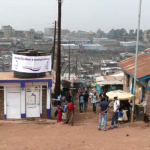Mnazi Mmoja is an informal settlement in Mombasa, located in the Kisauni Constituency. The area encompasses around 10 acres of land and has a population of around 4000. In such informal spaces the inhabitants struggle with many challenges. Access to adequate water is a primary concern.
This project is one of two that TWP is working on with our partner in the field. We have been involved in the design process, and are hopeful that the model of community run water kiosks in urban environments is one that we can develop further in the coming months.
The projects are collaborative, and include the municipal water utilities, local community based organisations and community members in all project planning and delivery. The key aim of this program is to facilitate the installation of community managed water kiosks, providing both clean affordable water to people living in informal settlements as well as a source of income within the community.
These kiosk projects utilise the municipal water supply. The water is carried from the main line and stored in a tank above the kiosk, and feeds two taps at ground level. The Water User Committee (WUC) will manage the facility, serving the community and charging an affordable rate per jerry can. The committee will manage the funds - with support from Pamoja Trust - and pay monthly water bills at commercial rates.
As well as the kiosk and corresponding community management structure, Pamoja Trust, in conjunction with the Ministry of Health are also running hygiene and sanitation promotion workshops, and engaging the community in discussions around public health, hygiene and sanitation.


 Rehabilitation Project
Rehabilitation Project











